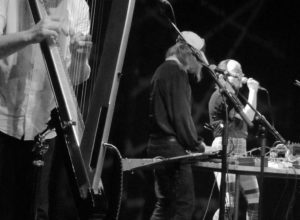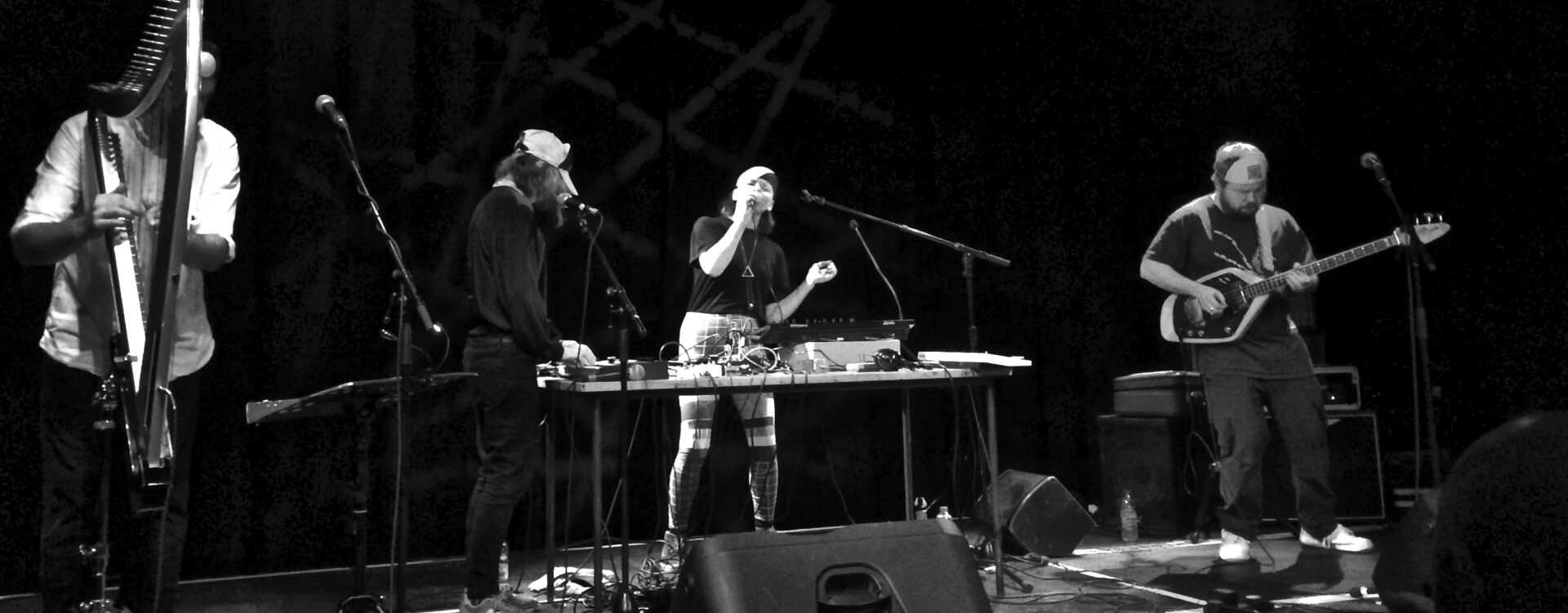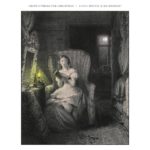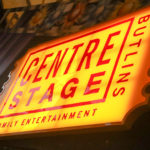Hen Ogledd are in Cardiff tonight to promote their new LP Mogic, an enquiry into the musical interstices between magic and logic. The record’s ten songs sprint through social media, synth pop, robotics, ancient languages, freeform harp improvisation, and other insoluble mysteries, its style and emotional tenor shifting in an assured and occasionally very daft manner. This trick is partly carried off by the presence of three sharply distinct lead vocalists, Sally Pilkington, Dawn Bothwell and the inestimable Richard Dawson, and partly by Rhodri Davies’ astonishing harp playing.
The last time Hen Ogledd put an album out Dawson’s star was already rising, but since the release of 2017’s superlative double LP Peasant, he’s quite rightly become a bona fide indie rock god. As a consequence Chapter is packed out with a very receptive audience. Not only that, but ‘Hen Ogledd’ means ‘the Old North’ in Brythonic, the language spoken by the ancient Celtic peoples who occupied the land between Aberystwyth and Newcastle. It’s closely related to modern Cymraeg, and part of the conceit is that the band’s four members are drawn from the four ancient Brythonic tribes. Quite how this ties up with science fiction, we’ll see, suffice to say this is an audience well versed in Celtic futurism. We’re imbued with it around here, familiar as we are with the dystopian vision of Gwenno’s Y Dydd Olaf, itself based on Owain Owain’s 1976 Welsh language sci-fi novel about a man resisting a tyrannical machine world. Coal and steel made Wales’ connection with modernity a chthonic one and our era’s links with the spectral and persistent traces of a vanished world seem to make sense here.

Anyone hoping for what we shall refer to as the full Dawson will be slightly disappointed. Whenever I’ve seen him live his performances have been so raw and looked so physically painful that I’m always left fearful for the man’s health. He pushes his vocals and his whole body farther than seems wise. Tonight though, he seems relaxed, even when delivering the power-pop diatribe that is ‘Problem Child‘ – and if ever there was a song that might have required the full Dawson, this was it. He’s started letting the material do the work now and it’s a revelation. He’s every inch the anti-hero of an Iain M. Banks Culture novel, an impossibly ancient mind, imprisoned, tortured, feeding on its own regret and reflecting on a glassy, dead world from a mountaintop. In comparison with the firepower he’ll bring to solo favourites like ‘Poor Old Horse‘, he hardly breaks a sweat.
Meanwhile, Rhodri Davies is enthralling. His harp looks like something from the set of Blake’s 7, and he makes it do awful things that no harp should ever have to do. It rips up tense lead guitar lines or makes belligerent, prog excursions into trippy jazz. Not once did it sound like a harp, and listening to the album again today, part of me still doesn’t quite accept the evidence of my own eyes. But I was there and I saw: The dude plays a harp. ‘Dyma Fy Robot‘, which doesn’t quite convince on album drifts off on a satisfyingly Sun Ra tangent tonight, and it’s worth noting the debt to Afro-futurism, both in terms of it’s artistic and implied political intent, but also in its playfulness and keen sense of its own absurdity. The wisely judged beats and loops laid down by Bothwell and Pilkington provide a good solid synth-pop bedrock for these grandiose fantasies and keep us firmly away from more extravagantly psychedelic territory.
It’s clearest in the deadpan soliloquy of brooding menace and mystical longing that is ‘Tiny Witch Hunter’. With the assistance of a very silly electronic vocal effect, Pilkington reels off fetishistic sci-fi jargon: “Tiny tiny tiny tiny tiny witch hunter / laser laser laser laser laser-propelled / into into into into into the dark / searching for a flicker flicker flicker”, and it’s not clear if she’s a tiny hunter who is a witch or something tiny embarking on a witch hunt. She’s a sad supernova in any case and you’d probably best get out of her way whatever she’s up to. It’s funny but also possessed of the kind of deadly serious conviction you’d find in the no-budget intergalactic visions that make Funkadelic or classic era Doctor Who so compelling. There’s the same determination to tell epic tales on an intimate, and sometimes preposterously intimate scale. Switching vocalists and vocal effects helps give the set a theatrical clarity as different characters come on and offstage, each searching for something or pondering some question they can’t answer.
We’re left with a sense that while they put on a great show, it could go much further than it does and it will be well worth it when it gets there. They’ve a few dates lined upon for next year which seems to indicate that this is more than just larking about on a side project. For tonight though, our cyber-folk robo-troubadours are here, and I for one, welcome them.




